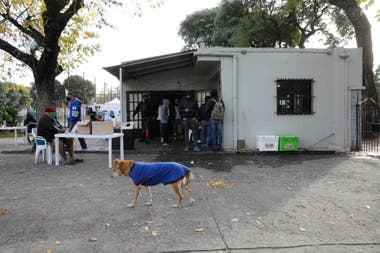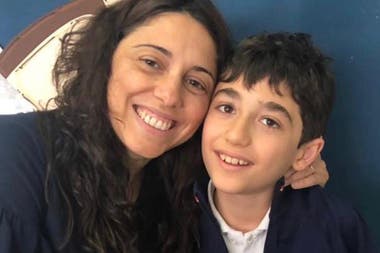The clear sky of Barracas is a relief: more is supported outside. Forty men win the concrete beach, the soccer and basketball courts, and also beyond, where the bars draw the limits of the
Pereyra Sports Center,
one of the last shelters enabled by the City Government so that
people in street situations pass the quarantine.
“There are a lot of kids here who have been consuming for years and have not taken drugs or alcohol for more than a month. They are banking her too well, they give her a lot of respect and respect”, explains the operator Sebastián Salazar, who works eight hours a day and before he knew how to be homeless. “I would not hold that long,” he concludes.
In the last week, these shelters became a threat, while the coronavirus once again demonstrated its contagion capacity when care measures are not adequate. On Tuesday, the City’s Ministry of Human Development ordered the closure of the Retiro Social Inclusion Center (CIS), after
79 of the 92 people who were under quarantine
at that hostel they tested positive for COVID-19. The data triggered the alarms and forced the authorities to take note. The Observatory of the Right to the City (ODC), along with other social organizations, reacted by presenting a precautionary measure so that the Buenos Aires Government relocates people living on the streets in hotels or social housing, considering that “the paradores create a situation of high risk of massive contagion due to the agglomeration of people “and prevention protocols are established.

For Horacio Ávila, reference of
Project 7
, the organization formed by and for people on the street, one of the problems is semantic. “Since 2013, you can’t call them ‘paradores’,” he explains, “because Law 3706 tells you that
are integration centers that must work 24 hours
Everyday of the year. If it had been fulfilled, all this quilombo would not have passed. ”
Ávila attends LA NACION in his “little office” in Pereyra -a headquarters that was opened in agreement with the Buenos Aires government in
context of the pandemic
and the Cold Operation is advanced, which is also a warehouse for goods, kitchen and wardrobes. He says he hears everyone talk about “the shelters”, but that no one bothers to come. He also says that he lives claiming bleach and chinstraps and that when he gets tired he goes to buy them, that he brought a television from his house so that the boys have something to watch, that he can barely keep the meter of distance between the beds of the
single bedroom
, that they had to
improvise a place of isolation
in the women’s bathroom. Later, an inflection in the voice reveals the intimate feeling that moves him: “People are the least of the problems.”

The Buenos Aires government has been reporting that since the start of the pandemic, the decision was made that all the Inclusion Centers of the City are open 24 hours a day, seven days a week to
ensure that everyone can comply with quarantine
. In addition, they detail that new spaces -like the Pereyra- were enabled with more than 900 beds, in addition to the 2100 available in the 32 Social Inclusion Centers that are distributed in the different neighborhoods, some under associated management such as the two of Project 7 (Monteagudo and Frida) and others from the GCBA.
The
cleaning
in Pereyra it is compulsive and the temperature is taken three times a day. No one can go out, except those who have to look for medication, consult the doctor or collect a subsidy.
The one who left, on returning must go directly to the bathroom, wash clothes and bathe
. Only later is contact with others allowed. They all wear masks or masks, and despite the discomfort of wearing it all the time, most meet the requirement.

“Here people met when they arrived and have a
forced coexistence with 40 people
of
t
Every age is very difficult. If you add abstinence to that, because most of them have been consuming for more than a month and a half,
it gets quite tense
“, recognizes Ávila. To contain them twice a week they receive visits from doctors and psychologists, assemblies are held and sports are encouraged. For Ávila, the treatment is comprehensive and interdisciplinary or it is useless:” It is not just ‘morfi’, hot bed or shower. The person is much more than that. ”
Expectation for the future
According to the latest survey by the City Government, there are 1,146 people living on the streets, a figure too far from the 7,251 surveyed by civil society organizations. Precisely, it is the social references that have been warning that, even in a context of pandemic and compulsory isolation, more and more people sleep on sidewalks or squares, multiplying the risks of contagion.
“Not all the spaces that used to be available and open for street people to eat or bathe are enabled; several are closed due to quarantine. In addition, m
many do not want to go to homes and inns out of fear
. That is why for about ten days more people have been seen on the streets, “explains Alexandra Carballo, one of the creators of
Work Culture Foundation
, which deals with the process of job reintegration of people who attend night hostels, transit homes, community canteens, and other assistance networks.
Ávila agrees that the massive contagion at the Retiro hostel spoiled confidence: “You panic, I’m here and I’m going to hit it, they think. But there is also our experience. We had a mild case of COVID-19 at the Center Che Guevara and we kept a strict quarantine for 14 days, reinforcing hygiene and personal distancing. There was not a single overflow. We are very proud because nobody left, everyone banked it. ”

Anxiety is the worst ally during confinement. To
uncertainty
of not knowing when the pandemic will pass, the question about
how will life continue
. “I would like this experience for them to be a before and after. That is very related to work. Once they leave, it will not be easy because it was no longer before entering,” warns Ávila, and immediately scares away any idea. pessimistic. “In Pereyra there is a lot of expectation for the future. There is talk of projects, of what they are going to do when they come out, and so the group sustains itself.”
In that propping up dreams he walks
Cristian
. Short, stringy, blonde to the eyebrows. He says he is 24 years old and
he’s been on the street for seven
. But he wants to highlight something else: “I’m an amateur boxer and I’m on my way to being a professional. My record is twelve fights won, 10 by knockout, and two tied. I have a coach and a manager.” As when passing add that also
he is taekwondo player and he represented the country in the last Youth Olympic Games
, where he won a silver medal for second place. He does not seem to understand the surprise caused by his story.

“I slept in the street or at the Parador de Retiro and then I went to train to Hurricane in Parque Patricios from eight in the morning to eight at night. I took care of myself at meals, doing everything well,” he clarifies, until the coronavirus his career paused:
I had a fight planned in Cúcuta, Colombia
, which, if it worked out, was going to take him to Mexico, the last stop until consecration in the United States.
On account of a successful future, he asks that his full name be published, with a nickname and everything: Cristian “El Temible” Castillo. The combinations of shots in front of the photographer are an extra enjoyment. A few meters away, someone looks at him with the gesture of a proud relative. His name is Raúl Fortini, he is 58 years old and he was brought in by a delegation from the Buenos Aires Presente (BAP) after finding him sleeping in the Plaza de Flores.
How to collaborate with projects that accompany people on the street?
-
Project 7:
in order to maintain the hygiene and isolation protocol in yours three centers
they need bleach, white soap on bread, alcohol, disposable gloves, chinstraps, paper towels, cotton; items such as mattes, light bulbs, large spray bottles (space cleaning), small spray bottles (object cleaning), cutlery and disposable plates. High nutrition foods, ginger, orange, garlic, red bell pepper, spirulina, lemon and honey. Medications: amoxicillin, ibuprofen, expectorant syrup; Those who can collaborate communicate to Whatsapp +5491154967848; [email protected]
-
Friends on the Camino:
They continue to make night tours to assist people in a situation of cale in CABA. They need masks, protective masks, gloves, fine alcohol, gel alcohol and bleach. In addition, they launched a permanent hygiene kit campaign: they can be purchased10 kits
,
30
,
60
or
100
. The organization takes care of picking them up by the supplier and delivering them on the tours. They also urgently need disposable tableware to distribute food. In
Facebook
You can learn more about the work they do. To contact [email protected]; tel .: (011) 15-5838-7458.
-
Back dining room, villa 31 bis:
the canteen that feeds people on the street tripled the food rations during the quarantine, receives donations through this site:https://donaronline.org/asociacion-civil-el-comedor-del-fondo/hacete-socio-del-comedor-del-fondo
and food from neighbors who live near the neighborhood; you can learn more about what they do for your s
web site
.
-
Lumen Cor:
he’s looking for volunteers for his emergency team to do day tours of the City and cook for the homeless; they also receive non-perishable food and warm clothing, blankets and footwear. By WhatsApp: 11-2714-7078;www.lumencor.org
ALSO
.
Publicado en el diario La Nación




